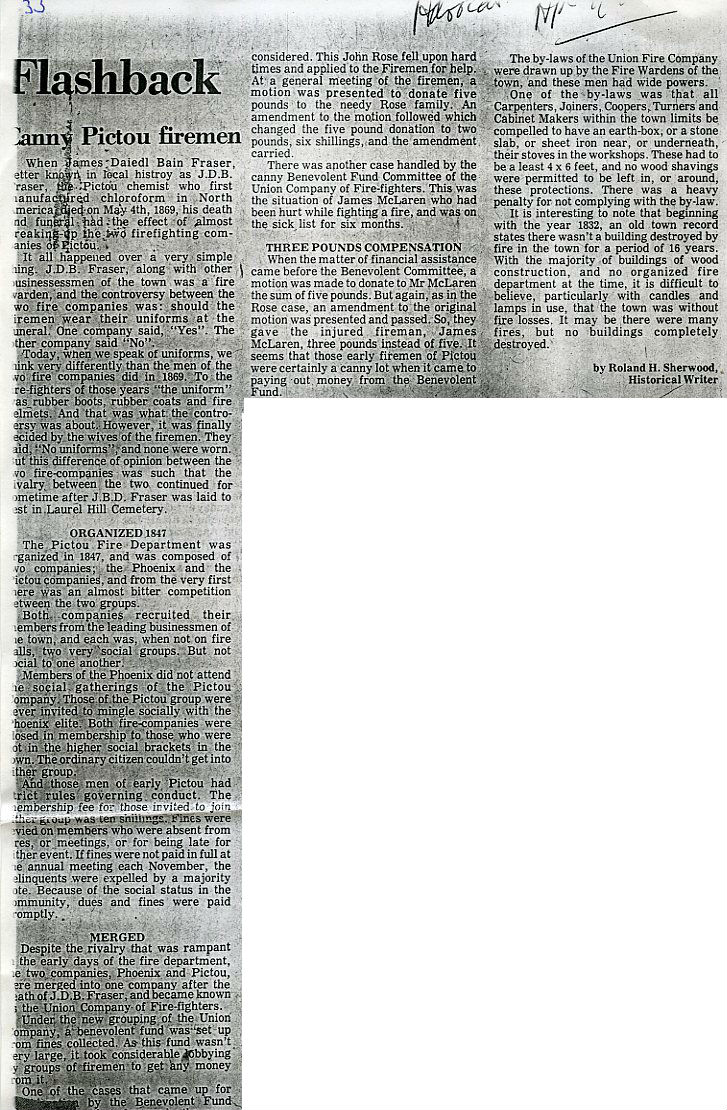
Canny Pictou Firemen
When James Daniel Bain Fraser, better known in local history as J.B.D. Fraser, the Pictou chemist who first manufactured chloroform in North America died on May 4TH, 1869. His death and funeral and the effects of almost breaking up the two firefighting companies of Pictou. It all happened over a very simple thing. J.D.B Fraser, along with other businesses men of the town was a fire warden, and the controversy between the two fire companies was; should the firemen wear their uniforms at the funeral. One company said, “Yes” the other company said “No.”
Today, when we speak of uniforms, we think very differently than the men of the two fire companies did in 1869. To the fire-fighters of those years “the uniform” was rubber boots, rubber coats and fire helmets. And that was what the controversy was about. However, it was finally decided by the wives of firemen. They said, “No uniforms,” and none were worn. But this difference of opinion between the two fire-companies was such that the rivalry between the two continued for sometime after J.B.D. Fraser was laid to rest in Laurel Hill Cemetery.
ORGANIZED 1847
The Pictou Fire Department was organized in 1847, and was composed of two companies; the Phoenix and the Pictou companies, and from the very first there was an almost bitter competition between the two groups.
Both companies recruited their members from the leading business men of the town, and each was, when not on fire call, two very social groups. But not social to another.
Members of the Phoenix did not attend the social gatherings of the Pictou company. Those of the Pictou group were never invited t mingle socially with the Phoenix elite. Both fire-companies were closed in membership to those who were not in the higher social brackets in the town. The ordinary citizen couldn’t get into either group.
And those men of early Pictou had strict rules governing conduct. The membership fee for those invited to join the group was ten shillings. Fines were received on members who were absent from fires, or meeting or for being late for either event. If fines were not paid in full at the annual meeting each November, the delinquents were expelled by a majority vote. Because of the social status in the community, dues and fines were paid promptly
MERGED
Despite the rivalry that was rampant in the early days for the fire department, the two companies, Phoenix and Pictou, were merged into one company after the death of J.B.D. Fraser, and became known as the Union Company of Fire-fighters.
Under the new grouping of the Union Company, a benevolent fund was set up from fines collected. As this fund wasn’t very large it took considerable lobbying by groups of firemen to get any money from it.
One of the cases that came up for …. PARAGRAPH BLACKED OUT … considered. This John Rose fell upon hard time and applied to the Firemen for help. At a general meeting of firemen, a motion was presented to donate five pounds to needy Rose family. An amendment to the motion followed which changed the five-pound donation to two pounds, six shillings, and the amendment carried.
There was another case handled by the canny Benevolent Fund Committee o the Union Company of Fire-FFIGHTERS. This was the situation of James McLaren who had been hurt while fighting a fire, and was on the sick list for six months.
THREE POUND COMPENSATION
When the matter of financial assistance came before the Benevolent Committee, a motion was made to donate to Mr. McLaren the sum of five pounds. But again, as in the Rose case, an amendment to the original motion was presented and passed. So, they gave the injured fireman, James McLaren, three pounds instead of five. It seems that those early firemen of Pictou were certainly a canny lot when it came to paying out money from the Benevolent Fund.
The by-laws of the Union Fire Company were drawn up by the Fire Wardens of the town, and these men had wide powers.
One of he by-laws was that all Carpenters, Joiners, Coopers, Turners and Cabinet Makers with in the town limits be compelled dot have an earth-box, or a stone slab, or sheet iron near, or underneath, their stoves in the workshops. These had to be at least 4 x 6 feet, and no wood shavings were permitted to be left in, or around, these protections. There was a heavy penalty for not complying with the by-law.
It is interesting to note that beginning with the year 1832, an old town record states there wasn’t a building of wood construction, and no organization fire department at the time, it is difficult to believe, particularly with candles and lamps in use, that the town was without fire losses. It may be there were many fires, but no buildings completely destroyed.
By Roland H. Sherwood
Historical Writer
Vault Roland Sherwood File
| File number: | 01-597.11af |
| Contributor: |
|
| Tags: | Roland Sherwood, James Daiedl Bain Fraser, Laural Hill, James McLaren, Pictou |
| Views: | 1177 |
| Uploaded on: | September 19, 2016 |